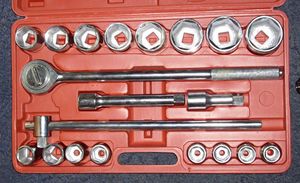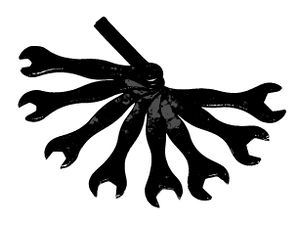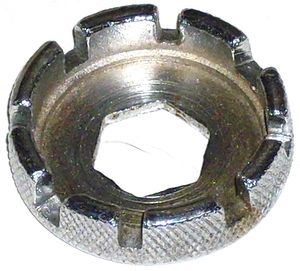Spanner
Spanner types
Open end
Ring
Not as prone to slipping off as open end, but usable in less situations.
Combination
A combination spanner has 2 different types of driver on the one spanner. Most often these are open and ring, but other combinations are also available.
Ratchet
Adjustables
Adjusable spanners are called wrenches.
Self adjusting
Box spanner
The forerunner of the socket set. Lighter, cheaper, weaker, and no longer popular.
Socket set
Cast steel sockets can apply much more torque and control than open ended spanners, but are more cumbersome and can't always be used.
Extension bars enable clearing nearby obstacles.
Torque wrenches enable setting bolts or nuts to precise torque. A few different types exist.
Deep sockets can be used where bolt threads protrude, and on spark plugs.
Size
Sockets have a square hole in to drive them, and this can be any of several sizes:
- 1/4" - for very light duty work eg appliance case screws
- 3/8" - light & medium duty. Can do a fair percentage of car work
- 1/2" - good for a lot of general purpose use, most popular for car work, but not big sizes or high torque jobs
- 3/4" - good for heavy duty work, eg washing machine bearings, tougher items on cars and larger vehicles.
- 1" - industrial duty
- 1.5" and 2.5" also exist, but aren't often seen.
1/2" drive is by far the most popular size.
Stamped spanner
Most spanners are cast, these ones are stamped from sheet metal. The result is a thin flat spanner with lower weight and strength. They're plenty strong enough for a wide range of tasks, but the thin metal edge makes applying high forces with a bare hand painful. Fine for medium force.
Stamped spanners tend to be made from mild steel rather than the tougher rust proof chrome vanadium steel used for most spanners, so should always be stored dry as they rust readily.
Stamped spanners tend to come as accessories supplied with an appliance. Manufacture cost is much lower than cast spanners. Whole sets of stamped spanners are rarely seen.
Multispanner
A stamped sheet spanner with many different size cutouts around the edges, or a casting with many recesses. Available in a few well known patterns. These don't give good performance for general DIY use, they're better suited to bikes where the low weight and size is a definite advantage, and they don't see much use. The smallest ones (pictured) are the least friendly to use.
Basin wrench
Can undo taps from a greater variety of positions than other spanner types. Useful when working in confined positions.
Wrenches
Spanners are known as wrenches in American English. Adjustable spanners are usually called wrenches here.
Spanner sizes
What the size means
Metric sizes and most imperial sizes (AF but not BSW or BSF) are 'across flats' dimensions, ie from top to bottom on this diagram:
____ / \ / \ \ / \____/
Whitworth sizes and BSF, which aren't too common nowadays, are measured quite differently.
Substituting sizes
One handy tool is a list of the exact metric sizes of all common imperial spanners. This is because some imperials make a good fit for metric nuts and vice versa - although many don't. A good example is 3/4", which is 19.05mm.
This is definitely not a recommendation to use the sizes that don't fit well, this can damage nuts & spanners, and injure hands when they slip.
More torque please
Extension tubes
Fitting steel tube over a spanner to get much more leverage works, but is a known cause of injuries. Where large leverage is needed, a socket is a safer option, with long handles available.
Impact wrench
When even more torque is needed, an impact wrench is the best choice. This is much better controlled way to apply high torque than hand tools.


